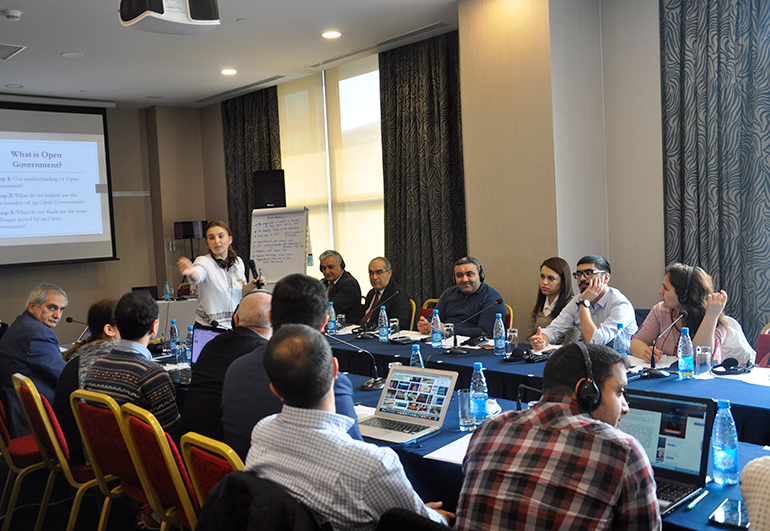
Azerbaijan Training Underscores Obstacles to, Opportunities for Open Government Gains
In the five years since the Open Government Partnership (OGP) launched, it’s encouraging to hear increasingly more talk about governments committing to the initiative and making it work. Eurasia (as discussed in an NRGI-led February meeting in Kiev, Ukraine) is a region both promising and challenging for the partnership.
Open government agenda implementation challenges in Eurasia are various. Lack of political will and capacity to embed the initiative’s principles in OGP national action plans are obstacles. However, well-trained and well-informed civil society activists ensure sustained demand for open government. OGP’s steering committee, meanwhile, will be evaluating Azerbaijan’s status in May, one year after the country was made inactive in the partnership.
A March media and civil society training session in Baku, Azerbaijan—the first of its kind in the capital for civil society and media—focused on these challenges, as well as the philosophy of open government and implementation processes. Some of participants in this month’s training will be involved in monitoring the country’s OGP national action plan, and their resultant report could factor into the international OGP decision on Azerbaijan’s status.
Many participants at the Baku meeting did not have a firm grasp of the concept of open government itself—the historical development of transparency practices and their benefits and challenges. Participants stressed the importance of critical thinking as a driving element for demanding open government. Values of open government could be instilled in the school curriculum, and in ongoing professional development trainings for public servants, they suggested.
Distinguishing between other widely used OGP concepts such as e-government and open data and their interconnections and important differences was important. For some countries, national action plans could be anchored in e-government-related commitments: participants challenged how much those contributed to an open government agenda.
In fact, OGP’s accountability mechanisms and practices allow for real flexibility in government commitments. One important constant is collaboration with civil society through the national action plan lifecycle.
As the meeting wrapped, it was clear that all Azerbaijani stakeholders have much to do to become active in OGP: the government must allow and enable civil society to operate, grow, and contribute to the development agenda of the country. OGP processes mandate that the government accepts and nurtures civil space, which is sadly is divided and weakened, and where transparency advocates see little progress.
In terms of open government, Azerbaijan is in a tough position. This month, the Extractive Industries Transparency Initiative (EITI) suspended Azerbaijan; the country subsequently withdrew from EITI. Capacitating practitioners and experts on the ground in the field of open government can only be a positive, and is as important as ever.
Veronica Cretu is the president of the Open Government Institute in Moldova and a former OGP steering committee member. She served as the lead trainer in the March OGP training in Baku.

